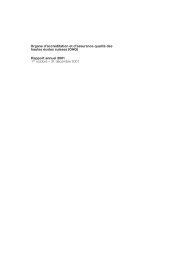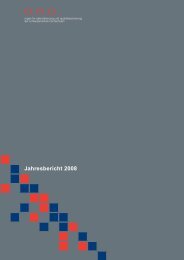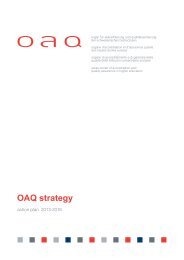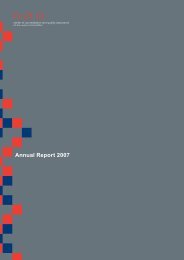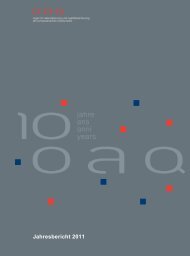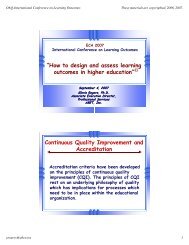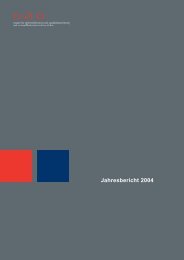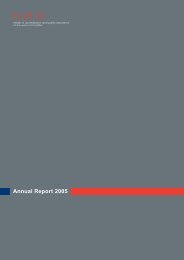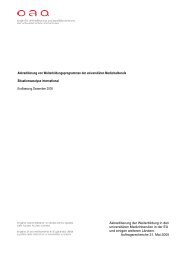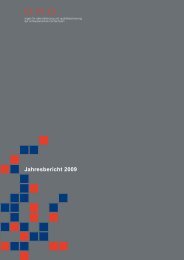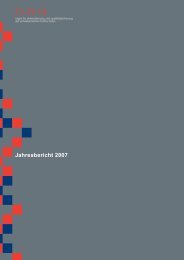Annual report 2010 PDF - OAQ Organ für Akkreditierung und ...
Annual report 2010 PDF - OAQ Organ für Akkreditierung und ...
Annual report 2010 PDF - OAQ Organ für Akkreditierung und ...
You also want an ePaper? Increase the reach of your titles
YUMPU automatically turns print PDFs into web optimized ePapers that Google loves.
A second aspect with which the <strong>OAQ</strong> will deal differently in future procedures is the com-<br />
position of the groups of experts. In future, the presence of QA specialists in the expert<br />
teams will be smaller. This is because expert groups are to consist of peers, i.e. experts<br />
who benefit from comparable professional knowledge, comparable experience and per-<br />
form comparable tasks in a comparable context.<br />
All in all, the second ro<strong>und</strong> of the Quality Audits confirmed the fact that external quality<br />
assurance is successful thanks to an institutional approach which respects the autonomy<br />
of the universities. The experience gathered from the 2007/8 cycle also provides an impor-<br />
tant contribution to the development of institutional accreditation for which provision is<br />
made in the draft text of a Federal Act on the Promotion of Universities and Coordination<br />
in the Swiss Universities Sector (HFKG).<br />
The summary <strong>report</strong> is published at www.oaq.ch<br />
2.2 <strong>2010</strong> procedures<br />
In the year <strong>und</strong>er review, the <strong>OAQ</strong> conducted three accreditation procedures and two<br />
formal reviews of compliance with imposed conditions.<br />
In addition, the <strong>OAQ</strong> <strong>und</strong>ertook preliminary reviews of private institutions and three proce-<br />
dures for the purpose of recognition <strong>und</strong>er contribution law pursuant to the Act on the<br />
Promotion of Universities (UFG) for the State Secretariat for Education and Research.<br />
On behalf of the Principality of Liechtenstein, the <strong>OAQ</strong> also performed an institutional<br />
evaluation of the University of Liechtenstein which ended with a positive outcome.<br />
3 Universities of applied sciences: a dynamic accreditation landscape<br />
3.1 Accreditation procedures<br />
The <strong>OAQ</strong> conducted 16 programme accreditations at universities of applied sciences<br />
pursuant to the accreditation directives of the Federal Department of Economic Affairs for<br />
universities of applied sciences.<br />
Because of the statutory requirement which stipulates that most master’s degree courses<br />
must be accredited by 2011, several universities of applied sciences submitted applica-<br />
tions in the year <strong>und</strong>er review to the <strong>OAQ</strong> for accreditation of their master’s courses. Two<br />
major cooperation projects were a special feature here:<br />
Firstly, the MSc in Engineering (MSE), a course developed jointly by the seven Swiss uni-<br />
versities of applied sciences established <strong>und</strong>er public law (Bern University of Applied<br />
Sciences - BFH, University of Applied Sciences North Western Switzerland - FHNW, Uni-<br />
versity of Applied Sciences Eastern Switzerland - FHO, Lucerne University - HSLU, Uni-<br />
versity of Applied Sciences of Italian-speaking Switzerland - SUPSI, Zurich University of<br />
Applied Sciences - ZHAW, and the University of Applied Sciences Western Switzerland -<br />
<strong>Annual</strong> Report <strong>2010</strong><br />
11



